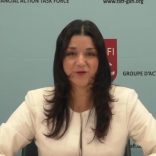Egyptian conservators give King Tut’s treasures new glow
Angelique Kidjo and three African youth activist groups honoured with Amnesty International award

AP (File photo) / In a 30-year career spawning 12 albums, Angélique Kidjo has been a prominent campaigner for freedom of expression and against female genital mutilation.
World-famous Beninese musician Angelique Kidjo has won a human rights award, along with three African youth activist movements, for their work defending freedom of expression and peaceful protest.
Rights group Amnesty International announced the winners Wednesday, praising Kidjo and the groups Y’en a marre (Fed Up), le Balai Citoyen (The Citizen’s Broom), and Lutte pour Changement, LUCHA (Fight for Change) for their work in Africa and around the world. Amnesty says the award honours those who have shown exceptional courage in standing up to injustice, and who have used their talents to inspire others and further the cause of human rights.
The honor known as the Ambassador of Conscience Award has previously gone to world leaders such as Vaclav Havel, Nelson Mandela, and Aung San Suu Kyi, as well as artists Bono, Joan Baez, and Ai Wei Wei.
Spreading ideas through music
Angelique Kidjo fled Benin in the 1980s after being pressured to perform for the country’s authoritarian regime. Famous before she left her homeland, she has since become world-renowned both for her music and her activism. While recording and performing a mixture of African and U.S. influences sung in a multitude of languages, she has also worked to promote free expression, education for young women, and birth certificates for children.
“I have always tried to use my voice – singing and spoken – to fight injustice and inequality. Amnesty International’s work throughout the years has been so courageous and extraordinary that receiving the Ambassador of Conscience award is intimidating to me! The award will energize me to stay outspoken about the crucial human rights issues of our time,” said Angélique Kidjo.
In an interview last year (May 2015) with VOA’s French to Africa service, Kidjo said music helps her spread her messages of freedom and human dignity. She told VOA’s Salwa Jaafari: “I can’t be in everyone’s home physically — my music will be there. And that’s the power of an artist, compared to a politician. Because no one can give a speech as brilliant as what we can put on a CD.”
The Grammy winner said she does not want to be a politician, but has hope that African nations struggling with internal corruption can solve their problems through democratic means. Kidjo said, “The day when the people — the people of Africa get up and say ‘we’re tired of this stupidity,’ it will be everyone together who will decide, not me.”
Speaking ahead of the May 28 awards ceremony, Kidjo said the award “will energize me to stay outspoken about the crucial human rights issues of our time.”
Grassroots activism
Also receiving the award is a group of Senegalese rappers and journalists who encourage young people to register to vote. The group known as Y’en a marre, or Fed Up, has been active in teaching peaceful protest methods and urging the government to implement land reforms, an issue important to the rural poor.
Three of the group’s founders were arrested in February 2012 for helping to organize a peaceful sit in protest against the government at that time.
Y’en a marre has remained active since the election, hosting meetings and urging the new government to implement promised reforms such as land reforms, a key issue affecting Senegal’s rural poor.
“There is no such thing as a foregone conclusion, there are only abandoned responsibilities,” said Fadel Barro, Y’en a marre’s coordinator.
Burkina Faso’s le Balai Citoyen, or the Citizen’s Broom, is a grassroots movement co-founded by reggae artist Sams’K Le Jah and rapper Smockey (Serge Bambara). The group has been active in voter education and has taught young people to speak out about political corruption and transparency.
Le Balai Citoyen has voiced concerns about a range of issues, from land grabs to power cuts, and mobilized people to claim their rights and fight impunity. Under the slogan “after your revolt, your vote” the group ran political education schools in a bid to enhance the voter registration rate among youths ahead of last November’s elections. The movement’s name refers jointly to “cleaning up” perceived political corruption and to the regular street-cleaning undertaken by Burkinabe citizens in their neighbourhoods. Le Balai Citoyen members carry brooms during protests to symbolise this.
In a public comment on the award, Smockey said: “To all those who have placed their trust in us and who have read through our acts the commitment to fight against injustice: we want to reaffirm that our convictions remain as strong and safe as our dreams, which underlie them.”
And Lutte pour Changement, or LUCHA, is based in the Democratic Republic of Congo, where the community-based activist group focuses on social issues, human rights, and the protection of civilians from armed groups. Nine activists associated with the group have been jailed in DRC and are considered by Amnesty to be prisoners of conscience.
Amnesty called on the DRC government in February to release the LUCHA activists. In a statement, Amnesty called their detentions for peaceful protests “a clear sign of the growing assault on independent voices and civil society” in the Democratic Republic of Congo.
LUCHA activist Fred Bauma was arrested along with 26 other activists in March 2015 when Congolese security forces stormed a press conference in Masina, Kinshasa. The conference was set to launch a youth initiative, Filimbi, aimed at educating the youth on participation into the democratic process in DRC. Fred Bauma remains detained along with Yves Makwambala, who designed the Filimbi movement’s website. Amnesty International considers them both prisoners of conscience, detained solely for peacefully exercising their rights to freedom of expression and association.
Protests and actions organized by LUCHA continue to be systematically repressed by the security forces. For example, since Bauma and Makwambala were detained, 32 other people have faced arrest solely for demanding their release. Currently, at least nine people connected to LUCHA are in jail.
“We are perfectly happy and deeply humbled to welcome this prestigious Award. It is the recognition of our commitment, and a great encouragement to keep up our non-violent fight for social justice and democracy in our country,” said Juvin Kombi, one of LUCHA’s members.
“We dedicate this Award to Fred, to all our fellow countrymen who are harassed for their civic engagement and to all people.”
Kidjo and her fellow awardees will be honoured at a ceremony in Dakar, Senegal, on May 28.
More information
The Ambassador of Conscience Award celebrates individuals and groups who have shown exceptional courage standing up to injustice, who have used their talents to inspire others and who have furthered the cause of human rights.
It also aims to create debate, encourage public action and raise awareness of inspirational stories and human rights issues.
Winners have:
- shown exceptional courage in standing up to injustice
- used their talents to inspire others
- furthered the cause of human rights
Previous recipients include:
Vaclav Havel (2003); Mary Robinson and Hilda Morales Trujillo (2004); U2 and Paul McGuinness (2005); Nelson Mandela (2006); Peter Gabriel (2008); Daw Aung San Suu Kyi (awarded 2009, presented 2012); Harry Belafonte and Malala Yousafzai (2013); Ai Wei Wei and Joan Baez (2015).












Leave a Reply
Be the First to Comment!
You must be logged in to post a comment.
You must be logged in to post a comment.